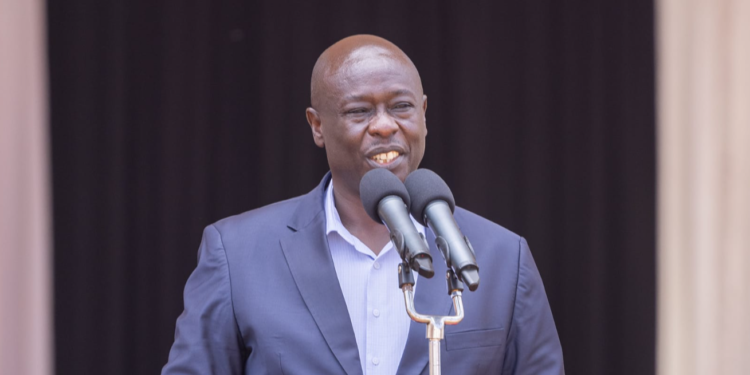Deputy President Rigathi Gachagua faces impeachment after a damning motion was filed by Hon. Mutuse Mwengi, citing multiple counts of gross misconduct, violation of the Constitution, and economic crimes, including allegations of corruption amounting to billions. The motion claims Gachagua’s divisive rhetoric and alleged financial improprieties have threatened national unity and undermined public trust in his office.
Deputy President Rigathi Gachagua is set to face impeachment following a motion introduced by Hon. Mutuse Mwengi, the MP for Kibwezi West. The motion details accusations ranging from gross violations of Kenya’s Constitution to engaging in economic crimes involving significant sums of money. The charges highlight Gachagua’s alleged ethnic discrimination, misuse of office, and corruption over the past two years, with a focus on both his public statements and questionable financial dealings.
According to the motion filed in the National Assembly, Gachagua’s conduct has violated key provisions of the Constitution, notably Articles 10, 27, and 73, which focus on the values of patriotism, non-discrimination, and integrity in public office. The Deputy President stands accused of fostering ethnic divisions through public remarks that suggest favoritism based on voting patterns during the 2022 general election.
In one of the most controversial moments outlined in the motion, Gachagua allegedly stated at a public event that government resources and opportunities would be distributed to communities based on their “shares,” a term he equated to votes cast for the current administration. “A government is like a company. There are shares, and those with the most shares get the most benefits,” Gachagua said in one of his speeches, according to evidence presented in the impeachment motion. This statement, along with others of a similar nature, has sparked accusations of undermining the national cohesion required of a high-ranking public servant.
Allegations of Gross Violations of the Constitutio
The impeachment motion accuses Gachagua of undermining the spirit of inclusivity enshrined in the Kenyan Constitution. Article 27 prohibits discrimination based on ethnicity, and Article 10 outlines national values such as patriotism, equity, and the rule of law. The motion alleges that Gachagua’s public statements, which appeared to reward certain ethnic groups while marginalizing others based on election results, were not only divisive but a gross violation of these constitutional principles.
Further accusations against Gachagua include his undermining of the Cabinet’s collective responsibility. The Deputy President is said to have contradicted government policy on several occasions, including dismissing government-approved actions for the evacuation of residents along the Nairobi River, a project aimed at mitigating climate change and protecting public safety. Despite being part of the Cabinet and tasked with overseeing the evacuation, Gachagua publicly dismissed the plan, creating confusion and discord within the government.
Economic Crimes and Financial Impropriety
The most financially damaging accusation against Gachagua involves economic crimes, including money laundering, corruption, and misuse of public office for personal gain. The motion outlines Gachagua’s alleged involvement in a web of businesses and proxies used to launder money and conceal proceeds of crime. It specifically names companies such as Spirit Way Limited and Fortis Vis Group Limited, which are linked to his family members, including his two sons. These companies are alleged to have accumulated vast wealth through illicit means, acquiring properties worth billions, including high-end real estate and businesses across the country.
Documents presented with the impeachment motion show that Gachagua’s business empire has grown exponentially during his tenure, with properties such as Treetops Hotel in Nyeri and Vipingo Beach Resort in Kilifi County named as part of his expansive portfolio. It is alleged that these properties were acquired through proceeds of corruption and influence peddling.
In addition, the motion highlights several suspicious financial transactions. For instance, Agrobriq Investment Limited, a company tied to Gachagua, reportedly received a transfer of KSh 55.5 million from the Deputy President’s office for the renovation of his official residence in Karen. The funds were allegedly laundered through multiple channels, including transfers to related entities, raising further suspicions of financial misconduct.
Further Allegations: Misuse of Office and Bullying
Beyond financial impropriety, the motion accuses Gachagua of abusing his power to influence state institutions for personal benefit. He is said to have coerced procurement officers and other public officials to award contracts to companies linked to his associates and family. Furthermore, he allegedly interfered with county government functions, particularly in Nairobi City County, where he is accused of unlawfully directing market relocations and undermining devolution.
The Deputy President’s treatment of public officials is also under scrutiny. Gachagua is accused of bullying and harassing state officers, especially within the security services. According to the motion, he subjected officials to public humiliation, and threatened staff in ministries and state institutions who did not comply with his directives.
Criminal Charges Under National Laws
In addition to constitutional violations, the motion presents serious allegations that Gachagua has committed crimes under national laws, including the National Cohesion and Integration Act, the Anti-Corruption and Economic Crimes Act, and the Proceeds of Crime and Anti-Money Laundering Act. Gachagua’s public utterances, described as inflammatory and divisive, are alleged to have stirred up ethnic tensions, which could be grounds for criminal prosecution under the National Cohesion Act.
Furthermore, the motion claims that Gachagua’s extensive real estate holdings, acquired in just two years, reflect a pattern of systematic corruption and money laundering. Evidence of suspicious land acquisitions, including a parcel in Embakasi and several properties across Nairobi, Nyeri, and Kilifi, are listed in the document.
















